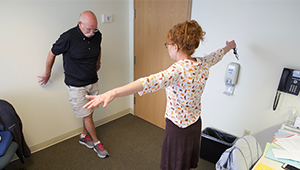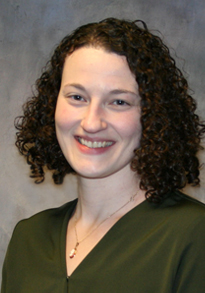Mikael Anne Greenwood-Hickman, MPH
Biography
Mikael Anne Greenwood-Hickman, MPH, brings a mixed methods approach to geriatrics and aging research. Through the application of both quantitative and qualitative methods, her work aims to better understand the lives and behavior of older adults in order to build interventions and tools to preserve cognitive and physical function and promote wellbeing.
Since completing her Master of Public Health in epidemiology at the University of Washington in 2014, Ms. Greenwood-Hickman has served in several roles within public health research teams, including as a data manager, programmer, and project manager. In 2021, Ms. Greenwood-Hickman formally joined the KPWHRI faculty as a collaborative scientist, bringing her operational knowledge and management skills to bear on her scientific portfolio.
Ms. Greenwood-Hickman’s research interests and work are primarily focused on understanding physical activity and sedentary behavior patterns among older adults and developing and testing interventions to promote physical activity and reduce sedentary time. She has been an active collaborator on the Adult Changes in Thought (ACT) Study’s Activity Monitoring sub-study since 2018. As part of this work, she has a particular interest in research that links data gathered by accelerometers (activity trackers that electronically detect up-and-down, side-to-side, and back-and-forth motion) to cognitive and physical function outcomes in later life. Her current work in ACT explores applications of the 24-hour activity cycle framework to the epidemiology of aging. Outside of ACT, Ms. Greenwood-Hickman leads accelerometer data collection and processing for ongoing intervention and observational studies using a variety of research and commercial accelerometers and platforms. She pairs this work with qualitative analysis efforts that seek to elucidate participants’ lived experience engaging in physical activity and sedentary behavior research and behavior change.
Areas of research focus
-
Aging & Geriatrics
-
Behavior Change
-
Obesity
-
Physical Activity/Sedentary Behavior
-
Built Environment
-
Chronic Illness Management
Recent Publications
Greenwood-Hickman MA, Walker RL, Idu AE, Bellettiere J, Wing D, McCurry SM, Crane PK, Larson EB, Rosenberg DE, LaCroix AZ Current and historic patterns of chronic disease burden are associated with physical activity and sedentary behavior in older adults: an observational study 2025 Mar 17;25(1):1032. doi: 10.1186/s12889-025-22264-8. Epub 2025-03-17. PubMed
Greenwood-Hickman MA, Shapiro LN, Chen S, Crane PK, Harrington LB, Johnson K, LaCroix AZ, Lane LG, McCurry SM, Shaw PA, Rosenberg DE Understanding resilience: Lifestyle-based behavioral predictors of mental health and well-being in community-dwelling older adults during the COVID-19 pandemic 2024 Aug 12;24(1):676. doi: 10.1186/s12877-024-05251-3. Epub 2024-08-12. PubMed
Rosenberg DE, Wu Y, Idu A, Greenwood-Hickman MA, McCurry SM, LaCroix AZ, Shaw PA Historic Cognitive Function Trajectories as Predictors of Sedentary Behavior and Physical Activity in Older Adults 2024 Jul;79(7). doi: 10.1093/gerona/glae125. Epub 2024-05-15. PubMed
Zablocki RW, Hartman SJ, Di C, Zou J, Carlson JA, Hibbing PR, Rosenberg DE, Greenwood-Hickman MA, Dillon L, LaCroix AZ, Natarajan L Using functional principal component analysis (FPCA) to quantify sitting patterns derived from wearable sensors 2024 Apr 26;21(1):48. doi: 10.1186/s12966-024-01585-8. Epub 2024-04-26. PubMed
Rosenberg DE, Zhu W, Greenwood-Hickman MA, Cook AJ, Florez Acevedo S, McClure JB, Arterburn DE, Cooper J, Owen N, Dunstan D, Perry SR, Yarborough L, Mettert KD, Green BB Sitting Time Reduction and Blood Pressure in Older Adults: A Randomized Clinical Trial 2024 Mar 4;7(3):e243234. doi: 10.1001/jamanetworkopen.2024.3234. Epub 2024-03-04. PubMed
Healthy Findings Blog

Meet KPWHRI’s collaborative scientists
The division contributes to research across the institute with methodological and subject matter expertise.
New funding

Grant of over $55M to boost Alzheimer’s, dementia study
Kaiser Permanente Washington will co-lead an expanded ACT Program to better understand the aging brain.
Healthy Findings Blog

We decreased people’s daily sedentary time by an hour
Changing behavior isn’t easy, but Dr. Dori Rosenberg helped older people to stand and walk more.



